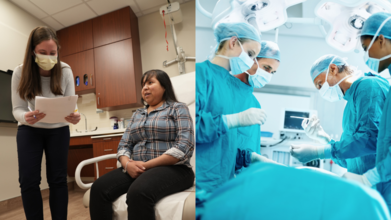- Health Conditions A-Z
- Health & Wellness
- Nutrition
- Fitness
- Health News
- Ayurveda
- Videos
- Medicine A-Z
- Parenting
- Web Stories
Cardiologist Reveals Constantly Feeling Sleepy Can Be A Sign Of Poor Heart Health

(Credit-Canva)
A simple search online for the signs of heart diseases will lead you to multiple lists of symptoms you can check. You may find symptoms like chest pain, feeling sweaty, feeling sick and having swollen ankles as a few of them. However, one thing, that although it is a part of all of these symptoms, gets ignored or overlooked by many people. A common theme in many cardiovascular diseases is how tired it can make you. It is almost as of your body is overworking to ensure your life isn’t threatened. Cardiologist Danielle Belardo, M.D., shared this information in an Instagram video, from the Health Exchange Podcast.
Cardiovascular disease (CVD) is a group of illnesses that affect your heart and blood vessels. These are the parts of your body that work together to move blood around. Common signs of heart problems are things like chest pain, trouble breathing, or swelling in your legs and feet. But what many people don't realize is that feeling extremely tired all the time can also be a big clue that something is wrong with your heart. This constant tiredness is called fatigue.
Is Fatigue a Sign of Heart Disease?
Dr Danielle explained yes, feeling very tired can absolutely be a sign of heart disease. Doctors say that people often ignore being tired because they think it's normal. They might blame it on being busy with school, work, or sports. But according to experts, a new or constant feeling of fatigue could be a serious warning sign.
It could mean you have conditions like heart failure, where your heart isn't pumping blood well, or coronary artery disease, where the blood vessels to your heart are blocked. It's important to pay attention to your body. If you feel tired in a way you haven't before and it won't go away, it's worth getting checked out.
What Happens To Your Heart When You Are Fatigued?
To see how fatigue affected heart functions, a 2009 study from Archives of Internal Medicine, studied 142 people who were divided into groups of low fatigue, moderate fatigue, and high fatigue.
What they found was that People who felt more fatigued had a lower cardiac index (CI) and stroke index (SI). This means their hearts were pumping less blood with each beat (lower SI) and each minute (lower CI) compared to people with less fatigue. This was true even after considering other factors like age or mood.
As expected, everyone's heart rate and blood pressure went up during the public speaking task. However, the study found that people in the high-fatigue group still had lower heart function (lower SI and CI) than those in the moderate- and low-fatigue groups. This suggests that fatigue might impact the heart's ability to pump blood efficiently, both when you are resting and when you are under stress.
What Diseases Could You Have With Chronic Fatigue?
Dr Danielle listed that if you are always feeling tired, it could be a symptom of several different heart conditions. Here are a few examples:
Coronary Artery Disease
This happens when the tubes that carry blood to your heart get narrow or blocked. This can make your heart work harder and lead to fatigue.
Heart Failure
This is a condition where your heart can't pump blood as well as it should. Because your body isn't getting enough oxygen-rich blood, you can feel extremely tired.
Cardiomyopathy
This is a disease that makes your heart muscle weak or thick. A weak heart has to work harder, which can cause you to feel fatigued.
Arrhythmias
These are problems with your heartbeat, making it either too fast, too slow, or irregular. When your heart doesn't beat correctly, it can't pump blood efficiently, leading to tiredness.
While many things can make you feel tired, it's a good idea to think about your heart health if your fatigue is new, constant, or you can't figure out why you're so exhausted.
78-Year-Old Retired Professor Shared His Secret To Keeping 'Razor Sharp' Memory Even As He Ages

(Credit-Canva)
It is no secret that as we age our memories decline and fade. We have all seen our grandparents age and slowly lose the agility they had when we were kids, how they remembered to bring our favorite sweets and foods, and tell us stories of their youth. However, this is no longer easy for them as their minds take an obvious turn for the worse.
We all wish to see our aging elders live their days peacefully and healthily and one of those aspects is their memory. However, it doesn’t always have to be this bleak, there are many people who have aged and also kept their minds strong, and this 78-year-old professor is giving everyone a run for their money.
Anthony D. Fredericks, a former education professor at York College of Pennsylvania, shared with CNBC, his simple habits that he credits with keeping his brain in top shape.
5 Habits That Keep Your Brain Strong Over 70
Never Stop Learning
Your brain loves a challenge. Whether you're learning a new language, taking a class, or doing a crossword puzzle, challenging your mind helps it form new connections. Research has even shown that staying mentally active over the years can lower your risk of dementia. As Fredericks says, reading widely and staying curious keeps your mind engaged.
Stay Social
Being lonely doesn't just make you sad; it can also slow your brain down. Having strong connections with friends and family has been linked to a lower risk of memory problems, lower blood pressure, and a longer life. An old professor, Fredericks, stays sharp by regularly spending time with friends, volunteering, and seeing family, which he believes helps his mind and overall well-being.
Keep Things Organized
Setting goals and staying organized can make your brain work better. When you organize your tasks, you activate the part of your brain responsible for planning and making decisions. Fredericks uses a simple, color-coded sticky note system to keep track of his daily tasks, a habit he says has made a huge difference.
Stay Active
Physical exercise is very important for a healthy brain. It increases blood flow to the brain, which helps create new brain cells and strengthens connections between them. Experts recommend at least 150 minutes of moderate activity each week, like brisk walking, swimming, or gardening. Fredericks himself swims and walks regularly to stay active.
Eat and Drink Smart
What you eat has a big impact on your brain health. A healthy diet, along with drinking plenty of water and getting good sleep, can help keep your mind sharp. Fredericks makes sure to eat heart-healthy foods like berries, leafy greens, and salmon. He also drinks at least eight glasses of water and gets at least seven hours of sleep every night.
Other Tips To Keep Your Mind Sharp As You Age
According to the National Institute of Aging, there are many ways to keep your mind as healthy as your body when you age. Including the points mentioned above by the professor, here are some additional tips to keep your memory strong.
Manage Blood Pressure
Keeping your blood pressure in a healthy range is not just good for your heart; it's also good for your brain. High blood pressure in middle age can increase the risk of memory and thinking problems later on. Get your blood pressure checked every year, and talk to your doctor about exercise, diet changes, or medicine if needed.
Address Health Problems
Conditions like a stroke or depression can seriously affect your brain. Getting the right treatment for these issues can help prevent or delay mental decline.
Be Smart About Medications
Some medicines can cause confusion or memory loss, especially in older people. Always talk to your doctor if you have concerns about your medications and never stop taking a prescribed medicine without their advice.
Meet This 32-Year-Old Woman, Who Survived Triple Organ Transplant And Cancer That Left Her Blind

(Credit-Northwestern Memorial Hospital/Canva)
It is not always that people get a second chance to change their lives. Terrible tragedies that can leave people struggling with illnesses and life-long disabilities, due to no fault of their own, can happen to anyone. However, this was not a story for her, it was her reality.
Jessica Lopez was diagnosed with cancer as an infant. The treatments saved her life, but they also caused long-term damage to her heart. By the time she was in her early 30s, she was facing a dire situation: her heart, liver, and kidneys were all failing. Her only hope was a rare and risky triple-organ transplant.
In a news release, her doctors at Northwestern Memorial Hospital explained how they were determined to help her. Despite the slim odds—this type of transplant had only been performed 59 times in the U.S. before—her positive attitude inspired them to take on the challenge.
Also Read: Is Pink Salt Weight Loss An Ancient Ayurvedic Ritual Or AI-Fueled Fad Trend?
Can Childhood Cancer Lead To Organ Failure?
As a child, Jessica battled leukemia and an eye cancer that left her blind. Although she beat the cancer, the aggressive treatments had a lasting effect. Unfortunately, it's not uncommon for childhood cancer survivors to have a much higher risk of heart problems later in life due to the harsh impact of treatments. In Jessica's case, her doctors believe this is what led to her heart failure, which then caused her liver and kidneys to fail.
After being placed on the transplant list, Jessica waited for a matching donor. The wait for three organs is especially long because they all must come from a single person. However, on February 24, a match was found.
The surgery was incredibly complicated. A team of surgeons worked together to transplant the heart and liver at the same time, followed by a separate procedure for the kidney. This allowed them to complete the surgery as quickly as possible.
Who Needs a Triple-Organ Transplant?
According to Mayo Clinic, triple-organ transplants are considered for people whose disease has damaged three of their major organs. For example, a person with severe heart failure might have a damaged heart that then causes their liver and kidneys to fail. In other cases, a problem with the liver or kidneys can lead to heart failure.
Because this surgery is so demanding on the body, doctors look for patients who are otherwise in good health. The patients who receive these transplants are often children or young adults, but older patients have received them as well.
What Are The Risks of Triple-Organ Transplant?
Getting a triple-organ transplant is a long and difficult process. First, the patient is put on a special transplant list, waiting for a single donor who can provide all three organs.
The surgery itself is extremely complex and can last for many hours. The heart is transplanted first, since it is the most fragile organ. The surgical team works with a detailed plan, like a "playbook," to make sure everything goes smoothly.
While a triple-organ transplant offers a chance at life for patients who have no other options, it also comes with higher risks than a single-organ transplant. The patient is at risk for serious complications like bleeding and infection. However, a highly skilled medical team can catch and treat these problems early, which is key to success.
A New Chance At Life
Jessica's journey back to health has been long, but she is now thriving with her new organs. She says she feels "reborn" and has more energy than ever. She has a stronger heartbeat and is filled with gratitude for her organ donor's selfless choice, which gave her a second chance at life.
Jessica, who has been cancer-free for 20 years, has never let being blind stop her from living a full life. She navigates her world with ease and is even planning a new career in forensics. She is also happily planning her wedding for 2026, looking forward to a bright future with her fiancé.
COVID-19 Vaccine Update: You Are Eligible For The Vaccine If You Have These Conditions

(Credit-Canva)
Currently US is experiencing changes in their COVID vaccine guidelines. In the past few weeks, the Center of Disease Control and Prevention changed their vaccine eligibility guidelines for children, giving parents and their healthcare professionals the autonomy to choose whether they want to get their children vaccinated. This was a highly contested decision, so much so that the American Association of Pediatrics released their own guidelines stating that all children ages 6 to 23 months should get the vaccine.
This year's updated COVID-19 vaccines have been approved by the U.S. Food and Drug Administration (FDA) with a more specific focus. The approval is for adults aged 65 and older and for younger people who have certain medical conditions that put them at a higher risk for severe COVID-19.
Federal health officials say that anyone who wants a vaccine can still get one after talking with their doctor. However, this narrower approval might make it harder for some people to get a shot if they don't meet these specific criteria.
Who Is Eligible For The COVID-19 Vaccine?
According to the U.S. Department of Health and Human Services, the new vaccines from Moderna, Pfizer, and Novavax are available for people at higher risk. The Centers for Disease Control and Prevention (CDC) has a long list of conditions that can put someone at higher risk for a severe COVID-19 infection. These include common issues like
- Asthma
- Blood cancers
- Cerebrovascular diseases
- Chronic kidney disease
- Some chronic lung diseases
- Some chronic liver diseases
- Cystic fibrosis
- Type 1 and 2 diabetes
- Gestational diabetes
- Disabilities, including Down syndrome
- Heart conditions
- HIV
- Mood disorders, including depression and schizophrenia
- Dementia
- Parkinson’s disease
- Obesity
- Physical inactivity
- Current or recent pregnancy
- Primary immunodeficiencies
- Current or former smoking
- Solid organ or blood stem cell transplant recipients
- Tuberculosis
- Use of immunosuppressive drugs
What Are The Major Risk Factors For COVID-19?
According to the CDC COVID-19 while having an underlying health condition is a big risk factor for severe COVID-19, other things can also increase a person's risk. Age is the biggest risk factor. For example, people ages 50 to 64 have a risk of death that is 25 times higher than people ages 18 to 29. The risk keeps going up with age:
Ages 65-74: 60 times higher risk of death
Ages 75-84: 140 times higher risk of death
Ages 85+: 340 times higher risk of death
Race and Ethnicity also play a role. The pandemic has had a more severe impact on racial and ethnic minority groups. These groups are more likely to get COVID-19, be hospitalized, end up in the ICU, or die from the disease—often at a younger age. This is often due to problems with healthcare access, like not having health insurance or reliable transportation.
What Are Some Other Condition That Are At Risk of COVID?
For some health issues, the link to severe COVID-19 isn't as clear and needs more research. These include epilepsy, hemophilia, sickle cell disease, and substance use disorders. Other conditions, like high blood pressure and Hepatitis B or C, have shown mixed results in studies, so it's not yet certain if they increase a person's risk of severe illness.
The CDC also mentions that doctors should look at a patient's age, health problems, and vaccination status to determine their risk. Here's what they should do:
Suggest Vaccination
Encourage patients to get the updated COVID-19 vaccine, as it's safe and effective.
Prescribe Treatment
Give antiviral medicines early to eligible patients to significantly lower their risk of hospitalization and death.
Encourage Prevention
Advise high-risk patients to continue wearing masks and to keep up with their regular medical appointments to manage their health conditions.
Help Everyone
Be sensitive to the needs of different groups, including racial and ethnic minorities. Doctors should offer resources and support to help all patients get the care they need.
© 2024 Bennett, Coleman & Company Limited

